- Clone
- 29A1.4 (See other available formats)
- Regulatory Status
- RUO
- Other Names
- NKp46, NCR1
- Isotype
- Rat IgG2a, κ
- Ave. Rating
- Submit a Review
- Product Citations
- publications

-

C57/BL6 mouse splenocytes were stained with NK1.1 Brilliant Violet 421™ and CD335 (clone 29A1.4) PE/Cyanine7 (left) or rat IgG2a, κ isotype control PE/Cyanine7 (right).
| Cat # | Size | Price | Quantity Check Availability | Save | ||
|---|---|---|---|---|---|---|
| 137617 | 25 µg | 113€ | ||||
| 137618 | 100 µg | 292€ | ||||
CD335, also known as NKp46, is a single-pass type I membrane protein of 46 kD. It belongs to the natural cytotoxicity receptor (NCR) family and contains two Ig-like (immunoglobulin-like) domains. It's expression is restricted to NK cells and a subset of NKT cells; it's not expressed in CD1d-restricted NKT cells. CD335 is a receptor for viral hemagglutinins and heparan sulfate proteoglycans and is involved in NK cell activation.
Product DetailsProduct Details
- Verified Reactivity
- Mouse
- Antibody Type
- Monoclonal
- Host Species
- Rat
- Immunogen
- NKP46-IgG1 Fc fusion protein
- Formulation
- Phosphate-buffered solution, pH 7.2, containing 0.09% sodium azide.
- Preparation
- The antibody was purified by affinity chromatography and conjugated with PE/Cyanine7 under optimal conditions.
- Concentration
- 0.2 mg/ml
- Storage & Handling
- The antibody solution should be stored undiluted between 2°C and 8°C, and protected from prolonged exposure to light. Do not freeze.
- Application
-
FC - Quality tested
- Recommended Usage
-
Each lot of this antibody is quality control tested by immunofluorescent staining with flow cytometric analysis. For flow cytometric staining, the suggested use of this reagent is ≤1.0 µg per million cells in 100 µl volume. It is recommended that the reagent be titrated for optimal performance for each application.
- Excitation Laser
-
Blue Laser (488 nm)
Green Laser (532 nm)/Yellow-Green Laser (561 nm)
- Application Notes
-
Additional reported applications (for the relevant formats) include: immunohistochemical staining of frozen tissue sections1,2 and in vitro activation of NK cells1.
-
Application References
(PubMed link indicates BioLegend citation) -
- Walzer T, et al. 2007. P. Natl. Acad. Sci. USA 104:3384. (FC, Activ)
- Walzer T, et al. 2007. Nat. Immunol. 8:1337. (FC, Activ)
- Guerriero JL, et al. 2011. J. Immunol. 186:3517. (IHC) PubMed
- Product Citations
-
- RRID
-
AB_11218594 (BioLegend Cat. No. 137617)
AB_11219186 (BioLegend Cat. No. 137618)
Antigen Details
- Structure
- Single-pass type I membrane protein, 46 kD; belongs to the natural cytotoxicity receptor (NCR) family; contains 2 Ig-like (immunoglobulin-like) domains
- Distribution
-
Mature and immature NK cells, subset of NKT cells, but not on CD1d-restricted NKT cells
- Function
- NK cells activation
- Ligand/Receptor
- Viral hemagglutinins, heparan sulfate proteoglycans
- Cell Type
- NK cells, NKT cells
- Biology Area
- Immunology, Innate Immunity
- Molecular Family
- CD Molecules
- Antigen References
-
1. Colucci F and Cilio CM. 2010. Nat. Immunol. 125:60.
2. Caligiuri MA. 2008. Blood 112:461.
3. Colonna M. 2009. Immunity 31:15. - Gene ID
- 17086 View all products for this Gene ID
- UniProt
- View information about CD335 on UniProt.org
Related FAQs
Other Formats
View All CD335 Reagents Request Custom ConjugationCustomers Also Purchased
Compare Data Across All Formats
This data display is provided for general comparisons between formats.
Your actual data may vary due to variations in samples, target cells, instruments and their settings, staining conditions, and other factors.
If you need assistance with selecting the best format contact our expert technical support team.
-
Brilliant Violet 510™ anti-mouse CD335 (NKp46)
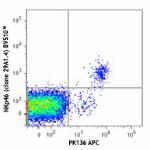
C57BL/6 splenocytes were stained with NK1.1 (clone PK136) AP... 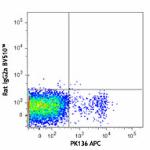
-
Brilliant Violet 711™ anti-mouse CD335 (NKp46)
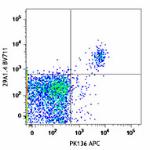
C57BL/6 splenocytes were stained with NK1.1 (clone PK136) AP... 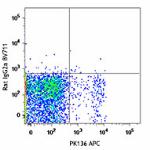
-
PE anti-mouse CD335 (NKp46)
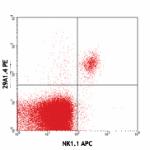
C57BL/6 mouse splenocytes stained with 29A1.4 PE and NK1.1 (... -
PE/Cyanine7 anti-mouse CD335 (NKp46)

C57/BL6 mouse splenocytes were stained with NK1.1 Brilliant ... -
Purified anti-mouse CD335 (NKp46)

C57BL/6 mouse splenocytes stained with purified 29A1.4 conju... -
FITC anti-mouse CD335 (NKp46)
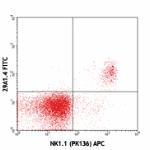
C57BL/6 splenocytes stained with NK1.1 (PK136) APC and 29A1.... 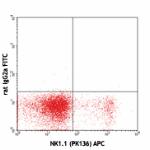
C57BL/6 splenocytes stained with NK1.1 (PK136) APC and rat I... -
APC anti-mouse CD335 (NKp46)
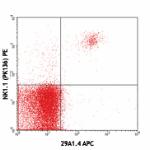
C57BL/6 mouse splenocytes stained with NK1.1 (PK136) PE and ... 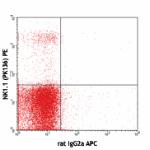
C57BL/6 mouse splenocytes stained with NK1.1 (PK136) PE and ... -
PerCP/Cyanine5.5 anti-mouse CD335 (NKp46)

C57BL/6 mouse splenocytes were stained with anti-mouse NK-1.... -
Brilliant Violet 421™ anti-mouse CD335 (NKp46)
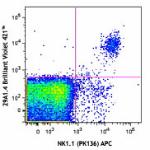
C57BL/6 splenocytes stained with NK1.1 APC and NKp46 (clone ... 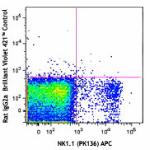
-
Biotin anti-mouse CD335 (NKp46)
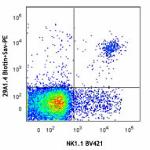
C57/BL6 mouse splenocytes were stained with NK1.1 Brilliant ... 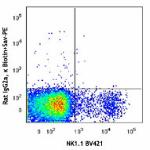
-
Brilliant Violet 605™ anti-mouse CD335 (NKp46)
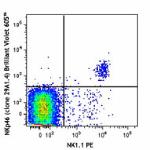
C57BL/6 splenocytes stained with NK1.1 PE and NKp46 (clone 2... 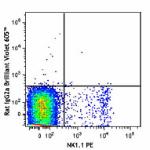
-
Purified anti-mouse CD335 (NKp46) (Maxpar® Ready)
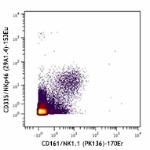
Mouse splenocytes stained with 153Eu-anti-CD335 (29A1.4) and... -
Alexa Fluor® 647 anti-mouse CD335 (NKp46)
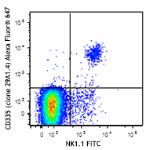
C57BL/6 mouse splenocytes were stained with NK1.1 FITC and C... 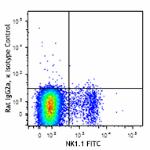
-
PE/Dazzle™ 594 anti-mouse CD335 (NKp46)
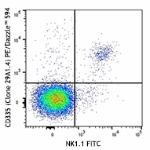
C57BL/6 splenocytes were stained with NK1.1 FITC and CD335 (... 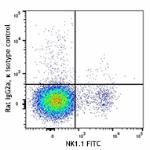
-
APC/Fire™ 750 anti-mouse CD335 (NKp46)
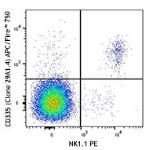
C57BL/6 splenocytes were stained with NK1.1 PE and CD335 (cl... 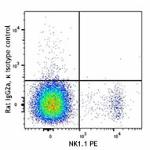
-
Brilliant Violet 650™ anti-mouse CD335 (NKp46)

C57BL/6 splenocytes stained with NK1.1 (clone PK136) FITC an... -
TotalSeq™-A0184 anti-mouse CD335 (NKp46)
-
Brilliant Violet 785™ anti-mouse CD335 (NKp46)

C57BL/6 splenocytes stained with NK1.1 (clone PK136) FITC an... -
Ultra-LEAF™ Purified anti-mouse CD335 (NKp46)

C57BL/6 mouse splenocytes stained with purified 29A1.4 conju... -
TotalSeq™-B0184 anti-mouse CD335 (NKp46)
-
TotalSeq™-C0184 anti-mouse CD335 (NKp46)
-
APC/Cyanine7 anti-mouse CD335 (NKp46)

C57BL/6 mouse splenocytes were stained with NK1.1 Alexa Fluo... -
PE/Cyanine5 anti-mouse CD335 (NKp46)

C57BL/6 splenocytes were stained with anti-mouse NK-1.1 FITC... -
PerCP/Fire™ 806 anti-mouse CD335 (NKp46)

C57BL/6 mouse splenocytes were stained with anti-mouse NK1.... -
PerCP/Fire™ 780 anti-mouse CD335 (NKp46)

C57BL/6 mouse splenocytes were stained with anti-mouse NK1.1... -
Spark Red™ 718 anti-mouse CD335 (NKp46) (Flexi-Fluor™)
-
Spark Blue™ 574 anti-mouse CD335 (NKp46) (Flexi-Fluor™)
-
Spark Blue™ 550 anti-mouse CD335 (NKp46) (Flexi-Fluor™)
 Login / Register
Login / Register 










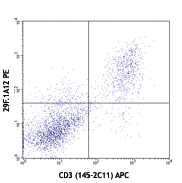
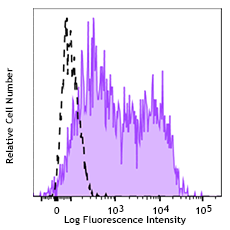
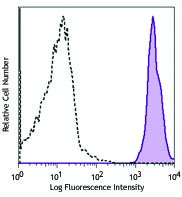
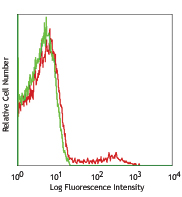



Follow Us